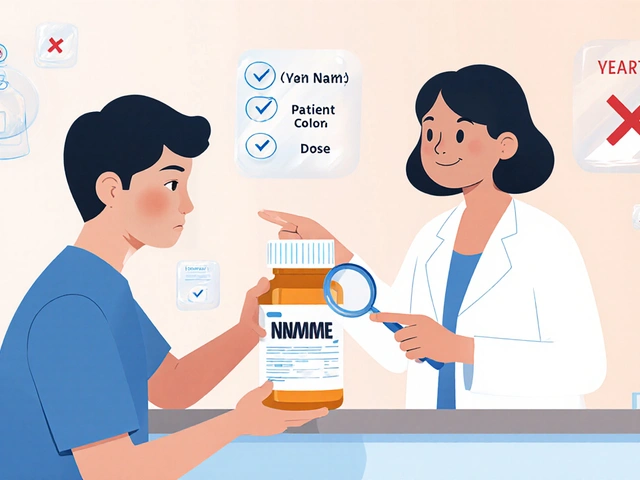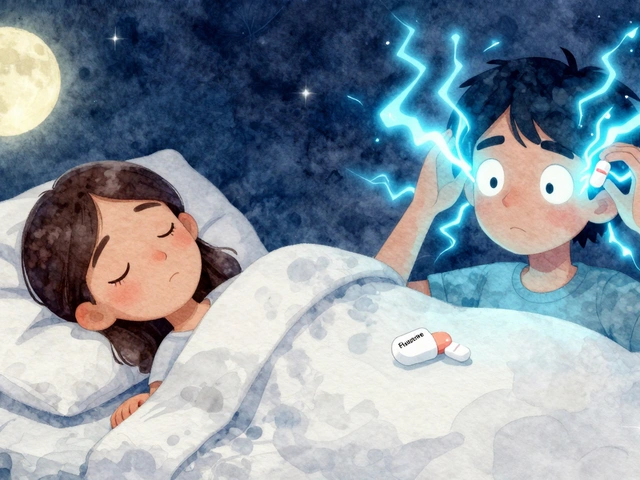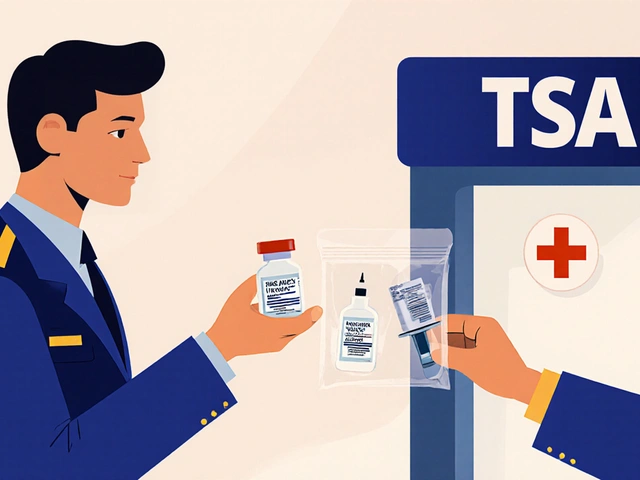 29
May,2025
29
May,2025
Picture this—a medication that could help someone finally silence the buzzing chaos of their mind, but might bring a whole new set of problems if you’re not paying attention. That’s Risperdal. It can be a real game-changer (and sometimes, a troublemaker) for those dealing with tough mental health conditions. Whether you clicked in because you’ve been prescribed Risperdal or you’re just worried about a loved one, no need to beat around the bush—you’ll want to understand exactly what you’re dealing with.
What is Risperdal, and Why Is It Prescribed?
Let’s set the record straight: Risperdal is the brand name for risperidone, a powerful antipsychotic drug that first hit the U.S. market back in 1994. Its main target audience? People with schizophrenia, bipolar disorder, and sometimes, kids with irritability related to autism. Sound wide-ranging? That’s because it is.
Schizophrenia isn’t just ‘hearing voices.’ It can feel like your thoughts are scrambled, your emotions out of sync, and even reality itself playing tricks on you. Bipolar disorder brings mood swings that can leave you riding a rollercoaster you never bought a ticket for. Then there’s irritability in autism—which isn’t your everyday tantrum but explosive outbursts that can turn a quiet afternoon into stormy chaos.
Doctors didn’t pull this out of thin air—there’s some heavy-duty science backing it up. Risperdal works mainly by blocking certain dopamine and serotonin receptors in the brain. That tidies up those wayward chemicals and calms down the symptoms. It doesn’t cure the underlying illnesses, but it can help someone function like themselves again.
What’s wild is that Risperdal isn’t a one-size-fits-all solution. While it’s FDA-approved for a few things, doctors sometimes prescribe it for off-label uses, like severe anxiety, PTSD, or even Tourette’s syndrome. That’s because mental health is complicated, and sometimes the usual tools don’t cut it.
One thing that makes Risperdal stand out is the range of doses—it can be taken as a tablet, a liquid, or even a long-acting injection. That gives doctors and patients flexibility. And according to data from the CDC, prescriptions have actually increased for kids and teens, which has raised a fair share of eyebrows in the medical world. If you’re wondering whether all this prescribing is justified, you’re not alone—there’s ongoing debate among psychiatrists and parents alike.
Here’s the lowdown: You only want to take Risperdal if a trusted doctor has given the green light. It’s not candy, and it’s not for minor mood swings or ‘just feeling down.’ If someone you care about is struggling with a serious mental health condition, this drug might be part of their road map to stability. But you’ve got to stay informed, and you’ve got to keep asking questions.
Risperdal Side Effects: The Good, the Bad, and the Bizarre
Talking about side effects can sound like reading the world’s scariest textbook, so let’s cut right to the chase. Risperdal isn’t a walk in the park. The most common complaints are drowsiness, dizziness, weight gain, and an increase in appetite. Not the end of the world for everyone, but they do add up.
But here’s where things get dicey—there’s a group of rarer (but important) side effects you need to know, and they don’t always show up on the warning label at your pharmacy. We’re talking about stuff like gynecomastia (breast development in males), changes in periods for women, and even something called tardive dyskinesia, which causes involuntary movements—think grimacing, blinking, or lip-smacking you can’t control. For parents, this can be especially stressful if the prescription is for a child or teen, and it’s not just a rumor—there have been lawsuits and headlines specifically over breast tissue growth in boys. Yikes.
Now, don’t freak out if you spot one weird symptom. A lot of people use Risperdal without these major issues, especially when they’re being monitored by a good doctor. But you’ve got to keep your eyes wide open. Any new, odd, or scary change? Report it to your healthcare team, no hesitation.
Here’s a quick stat breakdown based on recent studies from the American Journal of Psychiatry:
| Side Effect | Estimated Occurrence (%) |
|---|---|
| Drowsiness | 22% |
| Weight Gain | 18% |
| Anxiety | 10% |
| Movement Disorders (incl. Tardive Dyskinesia) | 5-8% |
| Hormonal Changes (Gynecomastia, etc.) | 3-6% |
If you notice any of the following, get medical advice right away:
- Really stiff muscles, high fever, or confusion (possible sign of a rare reaction called neuroleptic malignant syndrome)
- Unusual movements or constant restlessness
- Unexplained swelling, pain, or breast development in men or boys
- Signs of high blood sugar (extreme thirst, confusion, fruity breath)
- Fainting or problems with heart rhythm
One weird tip from long-time users? Watch salt intake. That’s because antipsychotics can mess with your body’s water balance, raising the risk for something called SIADH (another fancy acronym—syndrome of inappropriate antidiuretic hormone). It’s rare, but if you suddenly feel dizzy with headaches or confusion, especially in hot weather, let your doctor know.
So, the golden rule is: don’t play doctor on yourself. Track your symptoms, keep your check-ups, and don’t shrug off anything unusual. People react differently—what hits one person hard might only be a blip for someone else.

Real-World Tips on Taking Risperdal Safely
Managing mental health meds isn’t just about swallowing a pill and hoping for the best. Here’s some straight-up advice collected from doctors, pharmacists, and—maybe most importantly—people who’ve lived through it.
- Keep a notebook or phone app for symptoms. Jot down sleep, appetite, energy, and mood. If something changes, you won’t have to rely on your memory at the doctor’s office.
- Stick to the exact dose and schedule your doctor gives you. No freelancing. Don’t take double if you miss a pill—just take it as soon as you remember, unless you’re close to your next dose.
- Get bloodwork now and then. Risperdal can mess with blood sugar and cholesterol. Your doctor might need to monitor your weight, blood pressure, and even how your heart’s working.
- If you’re a parent, watch for sudden tiredness, behavioral changes, or speech difficulties in your child.
- If you’re taking other meds (including over-the-counter stuff like cold pills or antihistamines), tell your doctor. Mixing can sometimes ramp up the risks or make things less effective.
- Don’t mix with alcohol. It might sound like everyone says this, but Risperdal plus booze is really risky for confusion and drowsiness.
- Stay hydrated and avoid overheating—it can change how your body handles temperature. Taking a walk on a hot summer’s day might hit you harder than before.
- Don’t suddenly stop taking Risperdal. Withdrawal can be a real bear, including insomnia, agitation, or even a return of old symptoms.
Tech tip: there are now reminder apps designed for people on daily medications. Look up “MediSafe” or “MyTherapy.” Missing a dose can throw your system off, so let your phone do the heavy lifting.
If you’re worried about side effects like weight gain, talk to your doc about adding in some gentle exercise or tweaking your meal plan. A 2023 clinic study found even 20 minutes of walking a day can counter some of the sluggish metabolism that Risperdal brings.
Lastly—and this one’s important—don’t hide things from your medical team. Embarrassed about side effects? Annoyed about how it makes you feel? Tell them. Doctors can’t help if they don’t know what’s up. Sometimes, a lower dose or switching to another medication can solve the issue.
Lawsuits, Controversies, and What the Future Holds
No article on Risperdal would be straight without pulling back the curtain on the wild history of lawsuits and drama. Johnson & Johnson, the company that makes Risperdal, has paid billions in settlements because the drug was aggressively marketed for uses it wasn’t approved for—and for hiding some of the nastier side effects, especially in kids.
High-profile court cases in 2012 and 2013 found J&J guilty of pushing Risperdal for behavior problems in kids (when it wasn’t FDA-approved for that yet), and for not being honest about the risk of gynecomastia in young males. Some families were awarded millions in damages after their kids developed breast tissue. All of this put Risperdal and other antipsychotic drugs under a magnifying glass. In fact, the FDA cracked down on what’s called ‘off-label’ prescribing—even though doctors sometimes still use it when other treatments have failed.
All this drama changed the way doctors prescribe antipsychotics now. If a physician prescribes Risperdal, there’s more documentation, more follow-up, and more informed consent than ever before. Parents and patients should always ask outright: is this use FDA-approved, or are we in ‘off-label’ territory?
But it’s not all doom and gloom. The past few years have seen new approaches to minimize risks—like long-acting injections (which stick around in your body but you don’t have to take daily), and combinations with other treatments like cognitive-behavioral therapy (CBT). There’s even talk in the research world about tailoring Risperdal and similar meds to someone’s genetics, so future generations might dodge some of the nastier side effects.
Teens, especially, should get regular hormone checks—lactation or unexpected breast growth in males needs immediate medical attention. The stigma around antipsychotic meds is fading as mental health becomes more openly discussed, but that doesn’t mean it’s a decision to take lightly.
Nobody hands out trophies for gritting your teeth through the worst side effects. The smart move is staying honest with your doctor, being proactive about health changes, and making sure someone always has your back. And if you’re reading this in 2025, you’re in a world where there are more support tools and access to information than ever.
So, what’s the bottom line? Risperdal can be life-changing—for better or worse. Understanding how it works, what to look out for, and how to advocate for yourself (or your loved one) makes all the difference. Staying informed isn’t just smart—it’s necessary. Mental health journeys can be bumpy, but you don’t have to fly blind.






This article on Risperdal is quite enlightening, though it almost feels like we're peeling back layers of a heavy onion. There's always this philosophical dilemma when it comes to antipsychotic medication, isn't there? The balance between relief and risk, the interplay of mind and medicine. I can't help wondering if we're truly grasping the essence of what these drugs do to the soul as much as to the brain.
What moves me most is how this medication fits into the spectrum of human suffering and healing. Risperdal might smooth some edges, but at what cost? Still, the article did a good job highlighting practical tips for managing it daily, and I appreciate that human touch.
To address some of the points raised about Risperdal, we have to understand the mechanism of action at a granular biochemical level. Risperdal, or risperidone, acts primarily as a dopamine D2 receptor antagonist and serotonin 5-HT2A antagonist, which modulates neurotransmission associated with psychotic symptoms and mood regulation.
Ignoring such pharmacodynamics could lead to erroneous applications or mismanagement. The risks, including extrapyramidal symptoms, metabolic syndrome, and potential hyperprolactinemia, are nontrivial and should be meticulously monitored. This cautions against a casual approach to its use.
Can we truly master its implementation without a rigorous framework of evidence-based protocols? That remains a question for clinicians and pharmacologists alike.
Honestly, I find that articles like this one offer a good roadmap for everyday people trying to make sense of complicated stuff like Risperdal. It’s tricky, no doubt, but knowing about both its uses and risks helps reduce the fear factor.
It's reassuring to see practical tips included for patients and caregivers. That kind of real-world advice can make all the difference. Plus, mental health meds can seem so intimidating and distant otherwise.
I’m all for spreading accurate info in an accessible way, and this piece does pretty well at that. It’s a step in the right direction.
I really appreciate the empathetic tone this article takes when discussing Risperdal. For those of us caring for loved ones with complex mental health issues, understanding the side effects is crucial. Sometimes it feels overwhelming to balance the benefits with the risks.
The article's advice on managing the medication daily is practical and provides some peace of mind. I think a lot of caregivers need this kind of support and information to make informed decisions without feeling lost.
It's important to remember that each person's reaction to medication can differ, so ongoing communication with healthcare providers is key.
Well, here comes the drama—are we really convinced that Risperdal is the holy grail or the villain of psychiatric meds? The article tries to be balanced, but come on, the risks seem way scarier than the benefits in some cases.
People get prescribed Risperdal without enough talk about the long-term consequences. And what about the emotional rollercoaster? Some feel numbed out, others jittery as hell. The 'real-world tips' are fine, but let’s not sugarcoat the pain and the chaos it can create.
Honestly, sometimes I wonder if we're just tossing meds at problems that need way more nuanced solutions.
From a formal perspective, I must say the article encapsulates the essentials quite comprehensively while maintaining an approachable informal tone, which serves to broaden its audience reach quite effectively.
The clarity in delineating the medication's intended uses alongside its inherent risks serves as a useful guide for patients and caregivers alike. It fosters informed consent and aids in therapeutic compliance.
However, I believe supplementation with detailed warnings regarding drug interactions and the necessity of regular monitoring for side effects would further reinforce safe administration protocols.
While the article is informative, it could have benefitted from a more critical analysis of some data points, especially concerning side effects. It often feels like these issues are downplayed or generalized, which doesn't do justice to patients who might experience severe reactions.
A reserved, unbiased viewpoint is necessary, but I noticed some gaps in the depth of the discussion on risks that ought to be addressed in future content.
Clarity is good, but precision and thoroughness in such topics are paramount.
Grammatically, the article is well-structured and avoids ambiguity. The concise sentences improve understanding, which is important for such a complex topic.
Do you think it would help if future articles included more case studies or patient testimonials to humanize the experience further? This adds context and might improve relatability.
Also, considering the variety of side effects, how frequently do you find that dosage adjustments are made in clinical practice? Curious about the practical side here.
This article raises a lot of questions about the long-term use of Risperdal. I'm intrigued about its effect on different age groups, especially children versus adults. Are the risks higher or different in younger patients?
Also, how does Risperdal compare with newer antipsychotics in terms of efficacy and safety? Has anyone here seen firsthand how these differences play out?
Overall, it’s great to have a concise source, but the clinical nuances are what really matter to me.
As someone who works closely with patients, I think this article strikes a nice balance between helpful and informative. It makes the information easy to digest without oversimplifying the risks involved, which is a tough line to walk.
More resources like this can empower patients and caregivers to communicate better with their healthcare providers. But I’d like to see more emphasis on coping strategies for side effects because that’s what often impacts quality of life the most.
Good job overall, looking forward to more in-depth follow-ups!
Guess what? This whole Risperdal hype just feels like a circus sometimes. Everyone talks like it’s the solution, but then you hear all these horror stories about side effects ruining lives.
It’s like we’re caught in this endless loop of oh, it helps, but wait, it messes you up. And the emotional toll? People rarely talk about getting used to feeling like a zombie or swinging moods.
I get that it’s necessary for some, but seriously, we need more honest conversations about the dark side without sugarcoating. Anyone else feel the same?